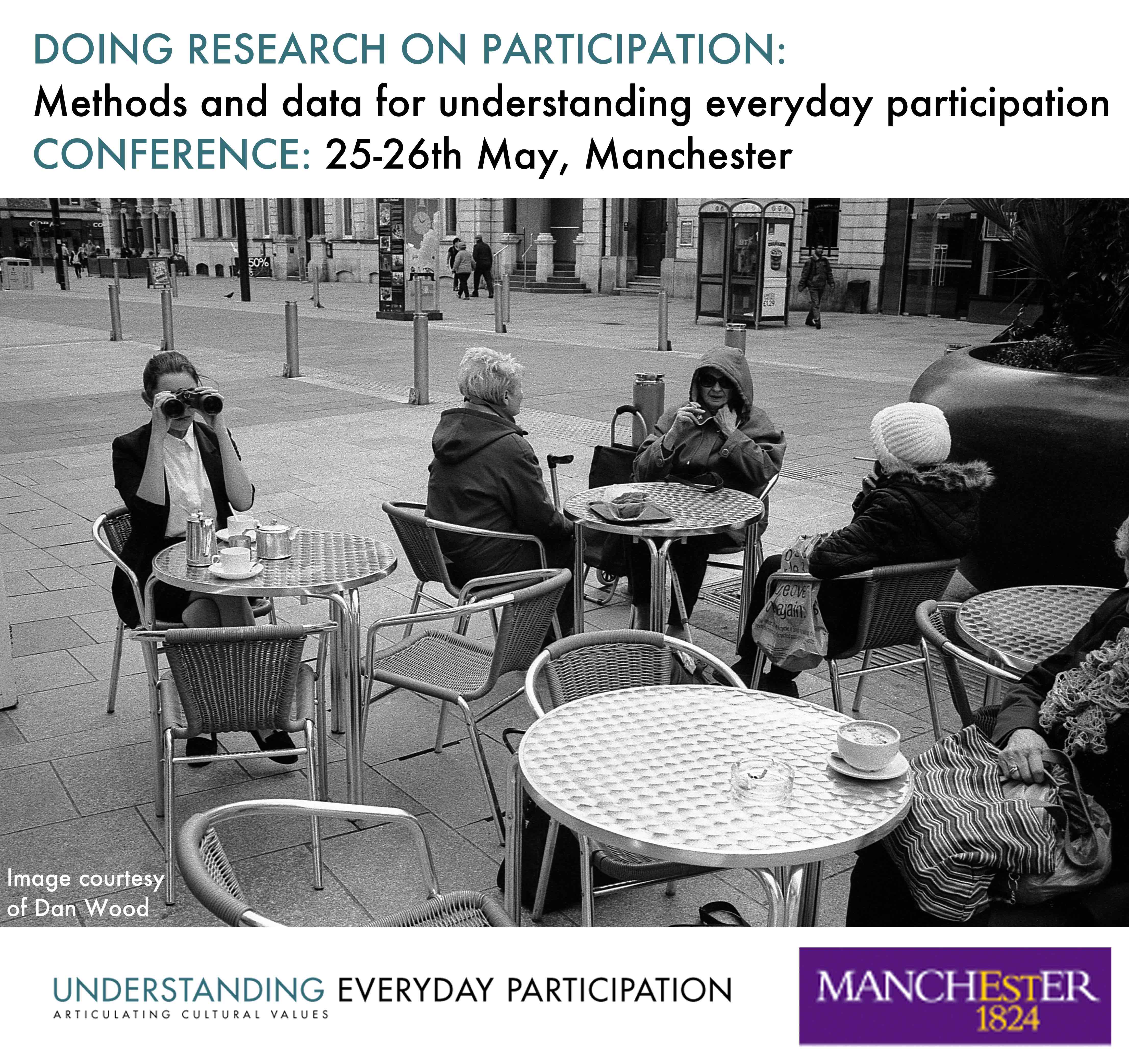
Location: Friends’ Meeting House, 6 Mount Street, Manchester, M2 5NS
Conference programme
Why a conference on cultural research methods?
Whilst the symbols and practices of cultural consumption occupy a central position in core debates within the humanities and social sciences, much cultural participation research tends to consider methods as mere tools for data analysis. Yet as the recent emphasis on the ‘social life’ of methods in fields such as Science and Technology Studies and the anthropology of expertise makes clear, methods should be seen as loaded devices, which are both rendered by and shaping of the social world.
In research on cultural participation, the domination of the sample survey, using traditional categories of cultural engagement and employing standard statistical analysis to examine the relationships between them, has reflected and reinforced a particular way of understanding participation; one that tends to hide as much as it reveals. This is not to say that survey research no longer has anything to contribute, but that other methods need to be brought into play, partly to help unpack the findings of standard approaches, but also to provide entirely different ways of ‘seeing’ participation. Crucially, this includes routes into understanding the forms, dynamics and consequences of participation that are placed outside or lie beyond the reach of traditional methods.
The call for ‘mixed methods’ approaches has become a customary trope within the social sciences behind which there are differing views as to what this might mean in practice for doing participation research. Pierre Bourdieu was one of the first in the field to recognise the importance of mixed methods strategies. His methodological toolkit ranges from the use of interviews and photographs in the anthropological tradition to statistical methods from geometric data analysis. But at the same time, Bourdieu and his followers also make strong claims against certain analytical alternatives.
To expand the reach of cultural participation research, several new models have been proposed. For example, Michelle Lamont’s concept of national repertoires deals with theoretical and methodological challenges for cross-national comparative research on boundaries, while Nick Crossley’s relational sociology highlights the limitations of Bourdieusian approach for the understating of networks of relationships embedded in social worlds.
These new frameworks, directly or indirectly, call for the refreshing of methodological paradigms. From an empirical perspective, thanks to the development of new quantitative methods for interrogating survey data, research has been able to provide more refined answers to more specific hypotheses. While multilevel regression models and GIS approaches allow an understanding of the impact of place on participation, social networks analysis illustrates how complex relationships among individuals can be, and classification techniques, such as cluster and latent class analysis, provide evidence about the shapes and patterns that participation takes. Alongside a vast number of techniques from different traditions, increasing on-line participation demands that we expand research to encompass virtual social networks, making big data and associated methods important analytical tools of for understanding participation.
The aims of this conference
The purpose of this conference is to re-visit the central issue of method in cultural participation research. We plan to address this from the two, overlapping, perspectives of conceptually- and empirically-driven work. On the one hand, we want to showcase research focused on understanding participation from different methodological perspectives (methods in practice); on the other hand, contributions highlighting the importance of the study of methods for understanding participation (methodological rationales).
Conference themes
- How to conceive of participation methodologically?
- What to measure about participation and why?
- How to approach ‘non-participation’?
- Capturing the times and timing of participation – time use, biography, history
- Understanding the scales and mobilities of participation – the role of space and place, from nations to localities and across boundaries
- Tackling (not so) new dimensions of participation: social networks, technologies, big data and social media
- How and why to mix methods for participation research?
The conference will consider a broad array of topics within research on participation and methods, which we have grouped across seven themes (above). See here for more on these themes.
Keynote speakers
Invited keynote speakers include:
- Philippe Coulangeon (Sciences Po, Paris, France).
- Nick Crossley (University of Manchester, UK).
- Tally Katz-Gerro (University of Haifa, Israel).
- Terhi-Anna Wilska (University of Jyväskylä, Finland).
In addition to keynote speakers, guest speakers and session leaders include: Predrag Cveticanin (TIMS, Serbia), Laurie Hanquinet (University of York, UK), Semi Purhonen (University of Tampere, Finland) and Understanding Everyday Participation team members.
Registration and Fees
Conference dinner will be held on the 25th of May at 19:00.
Conference Committee
Adrian Leguina (University of Manchester)
Andrew Miles (University of Manchester)
Claire Huyton (University of Manchester)
Susan Oman (University of Manchester)
We look forward to see you in Manchester!
Image courtesy of Dan Wood
